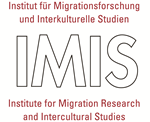| Projektart |
Drittmittelprojekt |
| Finanzierung |
|
| Themen |
- Aufnahme und Integration
- Gewaltmigration
|
| Disziplinen |
|
| Projektwebseite |
www.uni-trier.de |
| Laufzeit |
01/2020 ‒ 12/2022 |
| Geographischer Fokus |
|
| Institutionen |
|
| Beteiligte Personen |
-
Dr. Claudia Böhme
-
Prof. Dr. Michael Schönhuth
|
Kurzbeschreibung
Viele Geflüchtete verbringen einen Großteil ihres Migrationsprozesses an Transitorten wie Flüchtlingslagern, wo sie in ihrer Mobilität und Freiheit eingeschränkt sind. Gleichzeitig stehen heutigen MigrantInnen mit mobilen Kommunikationstechniken wie Smartphones und Online-Plattformen Medien zur Verfügung, die entgrenzend wirken. Dieser Zusammenhang zwischen Mobilität (people in motion) und Ortsbezogenheit (people at places), und Smartphones als mobile Werkzeuge bzw. soziale Medien als Grenzen überschreitende Informations- und Imaginationsräume soll in dieser Form erstmals in Relation mit Prozessen der Zukunftskonstruktion und Vertrauensbildung empirisch untersucht werden. Mit einem medienethnographischen Zugang, der persönliche Migrationsbiographien mit individuellen und kollektiven Medienpraktiken und -kulturen verknüpft, will das Projekt am Beispiel eines ostafrikanischen Flüchtlingslagers dabei insbesondere drei Zukunftsperspektiven von BewohnerInnen in den Blick nehmen: Die einer möglichen Weiterreise zu den Ziel-/Sehnsuchtsräumen (Europa/Nordamerika), die eines möglichen Abbruchs und der Rückkehr an den Herkunftsort, und schließlich die eines längerfristigen Verbleibens in den teils stadtähnliche Strukturen annehmenden Flüchtlingscamps. In weiteren empirischen Schritten sollen am Ende der ersten Förderphase ausgewählte Herkunftsorte von ForschungspartnerInnen aufgesucht und die Perspektive der Zurückgebliebenen erfasst, und in der zweiten Förderphase der weitere Verlauf der Migrationsbiographien der ForschungspartnerInnen verfolgt werden. Ein besonderes Augenmerk gilt dabei den in diesem Prozess etablierten, bzw. aufrechterhaltenen sozialen Netzwerkbeziehungen (lokal im Camp, virtuell darüber hinaus) und der Frage, wie in diesen Vertrauen aufgebaut/verhandelt, bzw. was, wann auf welchen Netzwerkkanälen kommuniziert wird. Die Feldforschung vor Ort soll durch Online-Forschung und die Erfassung und Analysen der genutzten Plattformen und Netzwerke unterstützt werden. Mit der Erweiterung des Vertrauens- und Zukunftsbegriffes außerhalb eines historisch-westlichen Diskurses setzen wir ganz explizit auch auf spezifisch ethnologische Erträge für die sozialpädagogische, linguistische und soziologische Forschung.
Abstract
Many refugees spend much of their migration process at transit places, such as refugee camps, where their mobility and freedom are restricted. At the same time, today's migrants have access to mobile communication technologies such as smartphones and online platforms which have a boundary expanding effect. This connection between mobility (people in motion) and location-relatedness (people at places), and smartphones as mobile tools or social media as boundary expanding spaces of information and imagination shall be empirically investigated in this form for the first time in relation to the processes of future construction and trust building. Using a media-ethnographic approach, which links personal migration biographies with individual and collective media practices and cultures, the project intends, with the example of an East African refugee camp, to focus on three perspectives of the inhabitants’ future perspectives: That of a possible onward journey to target places and places of longing (Europe/North America), that of a possible break-off/discontinuation and the return to the place of origin, and finally the prolonged stay in the partly city-like structures of the refugee camps. In further empirical steps, at the end of the first funding phase, selected places of origins of the research partners shall be visited to capture/include the perspective of those who were left behind, and in the second funding phase the further course of the migration biographies of the research partners shall be followed up. Particular attention is paid to the social network relationships/relations that have been established or maintained in this process (locally in the camp, virtually beyond that) and the question of how trust is established / negotiated, or what is communicated, when and on which network channels. On-site field research will be supported by online research and the collection and analysis of the platforms and networks used. With the extension of the concept of trust and future beyond a historical-western discourse, we also explicitly focus on specific anthropological results for social pedagogical, linguistic and sociological research.









